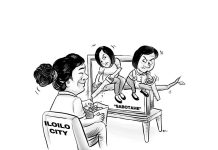
STILL, behind every success story is a person who chooses to care. Like the DepEd teacher goes beyond class hours to give remediation with pupils in need. Or the local registrar who personally calls applicants to fix their errors instead of just rejecting forms. Or the barangay health worker who visits far-flung families to distribute medicine and promote reproductive health care. Or the municipal engineer who spends weekends inspecting rural roads, not because it is in his job description, but because he believes that dignity through standard infrastructure should reach even the remotest sitios. Their brand of heroism is not loud, but it is real. It is the kind of goodness that Ignatian spirituality speaks of: competence with conscience, service rooted in love.
Some may dismiss these as “doing the bare minimum.” But in a system where mediocrity has been normalized, even decency feels radical. Let us remember: the public does not owe civil servants gratitude. It is the other way around. Taxes fund their salaries, benefits, and pensions. That is why every kind gesture, every extra mile walked, every technical concern facilitated, every question answered with patience—is a small act of moral reparation. Yet the best among them do not count these moments as medals. They serve not for applause but out of a quiet, stubborn belief that government should mean something good.
We know, of course, that this is not always the case. There are still offices where queues snake like punishment, where rudeness is routine, where files disappear into mysterious black holes. We are not blind to the inefficiencies and injustices. But to lump everyone together is lazy and unfair. For every horror story, there is a public servant holding the line, ensuring that systems do not fully collapse. As psychologist professor Sylvia Estrada Claudio once wrote, the best civil servants do not ask whether the public deserves their courtesy. They ask whether they themselves are worthy of serving the public.
Consider the story of a small-town health worker in Antique who walks for hours each week to reach indigenous communities, not for a photo op, but to check on prenatal care. Or the administrative aide in Antique who keeps track of scholarship grantees by memory because digital systems have not yet arrived. Or the BIR officer who could have earned thrice in the private sector but stayed because he believes that fixing internal revenue means fixing the spine of the nation.
These are the everyday heroes we often miss. Not because they are hiding, but because our eyes are trained to look for spectacle. This Heroes Day, may we expand our field of vision. May we recognize the heroism in quiet rooms, slow elevators, and crowded counters. In government ID kiosks. In traffic enforcers managing unruly intersections. In teachers riding bangkas to reach coastal classrooms in Carles.
Let us also challenge our leaders to ensure that the environment in which civil servants work is one of justice and motivation. Leadership must mean enabling, not exploiting. It must mean training, not threatening. If we are to demand excellence from our civil servants, we must also offer them the systems and salaries that reflect our respect. We cannot expect miracles from broken structures. But we can demand better blueprints.
And so to the many nameless, faceless public servants who choose to serve with integrity: this day is yours. Not because you are perfect, but because you show up. You listen. You help. You care. That is more than enough to earn our respect. That is heroism in its most functional form.
Heroes do not always have grand backstories or dramatic exits. Sometimes, they are just there—typing reports, checking clearances, answering inquiries, fixing computer bugs, filing records. They wear no capes. But they keep the country from crumbling. One paper, one smile, one decent decision at a time.
Let us not only honor the heroes of our past, but also the ones who quietly shape our present. Because the country lives and breathes not only through those who lead, but also through those who serve./PN







